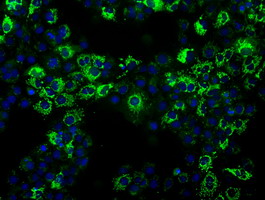ALDH2 Mouse Monoclonal Antibody (HRP conjugated) [Clone ID: OTI4H2]
CAT#: TA500615BM
ALDH2 mouse monoclonal antibody, clone OTI4H2 (formerly 4H2), HRP conjugated
Other products for "ALDH2"
Specifications
| Product Data | |
| Clone Name | OTI4H2 |
| Applications | FC, IF |
| Recommended Dilution | IF 1:50~100, FLOW 1:100 |
| Reactivities | Human, Mouse, Rat |
| Host | Mouse |
| Isotype | IgG3 |
| Clonality | Monoclonal |
| Immunogen | Full length human recombinant protein of human ALDH2 (NP_000681) produced in HEK293T cell. |
| Formulation | PBS (pH 7.3) containing 1% BSA, 50% glycerol and 0.02% sodium azide. |
| Concentration | 0.5 mg/ml |
| Purification | Purified from mouse ascites fluids or tissue culture supernatant by affinity chromatography (protein A/G) |
| Conjugation | HRP |
| Storage | Store at -20°C as received. |
| Stability | Stable for 12 months from date of receipt. |
| Predicted Protein Size | 54.4 kDa |
| Gene Name | aldehyde dehydrogenase 2 family member |
| Database Link | |
| Background | This protein belongs to the aldehyde dehydrogenase family of proteins. Aldehyde dehydrogenase is the second enzyme of the major oxidative pathway of alcohol metabolism. Two major liver isoforms of aldehyde dehydrogenase, cytosolic and mitochondrial, can be distinguished by their electrophoretic mobilities, kinetic properties, and subcellular localizations. Most Caucasians have two major isozymes, while approximately 50% of Orientals have the cytosolic isozyme but not the mitochondrial isozyme. A remarkably higher frequency of acute alcohol intoxication among Orientals than among Caucasians could be related to the absence of a catalytically active form of the mitochondrial isozyme. The increased exposure to acetaldehyde in individuals with the catalytically inactive form may also confer greater susceptibility to many types of cancer. This gene encodes a mitochondrial isoform, which has a low Km for acetaldehydes, and is localized in mitochondrial matrix. Alternative splicing results in multiple transcript variants encoding distinct isoforms. |
| Synonyms | ALDH-E2; ALDHI; ALDM |
| Reference Data | |
| Protein Families | Druggable Genome |
| Protein Pathways | Arginine and proline metabolism, Ascorbate and aldarate metabolism, beta-Alanine metabolism, Butanoate metabolism, Fatty acid metabolism, Glycerolipid metabolism, Glycolysis / Gluconeogenesis, Histidine metabolism, Limonene and pinene degradation, Lysine degradation, Metabolic pathways, Propanoate metabolism, Pyruvate metabolism, Tryptophan metabolism, Valine, leucine and isoleucine degradation |
Documents
| Product Manuals |
| FAQs |
| SDS |
{0} Product Review(s)
0 Product Review(s)
Submit review
Be the first one to submit a review
Product Citations
*Delivery time may vary from web posted schedule. Occasional delays may occur due to unforeseen
complexities in the preparation of your product. International customers may expect an additional 1-2 weeks
in shipping.






























































































































































































































































 Germany
Germany
 Japan
Japan
 United Kingdom
United Kingdom
 China
China






